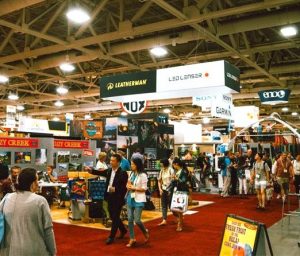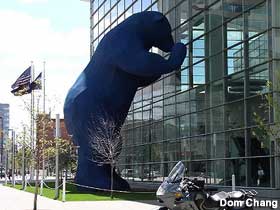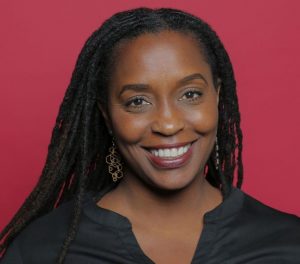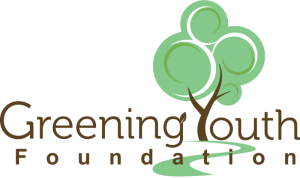
The usual OR scene in Denver. A no-go this year.
Each year on behalf of Cayuse Communications and the Best Horse Practices Summit, I travel to Denver for the Outdoor Retailer (OR), an enormous schoomze-fest at the Colorado Convention Center. It’s run by the Outdoor Industry Association (OIA), a 4,000-member trade group for outdoor recreation, a sector which annually generates nearly a trillion dollars in sales and provides jobs for about eight million people.
At the OR, I network with sponsors, fellow media folks, and brands who align with what we do. There are thousands of vendors – from Patagonia to the state of New Mexico, from Kate’s Real Food to the National Outdoor Leadership School. What we have in common is a love for the outdoors and keen interest in connecting with those who want to ‘get out.’

The big blue bear outside the Colorado Convention Center
I go as one of the very few representatives of the horse community. There aren’t many who walk this packed and pulsating venue in cowboy boots and jeans. I could blend in with shorts and hiking shoes, but my wardrobe choice is intentional. I’m making a point:
- Horse owners and riders are “out there” more than suburban recreationalists with bikes and stand-up paddleboards.
- We arguably have more intimate and informed connections with the outdoors than all those weekend warriors with all their high-end, specialized gear.
- We are educated, loyal, and interested in quality gear that stands by us through daily chores, as well as storms, bushwhacking episodes, midnight rides and crises of the wilderness and backcountry sort.
- We horse owners need to be engaged with the fluid, dynamic conversations around public space, access, and being active, engaged, and outside.

Angelou Ezeilo. Photo courtesy of Outdoor Retailer
This year the OR was moved entirely online. I joined the Zoom version of one of my favorite events, the OIA Industry Breakfast (past speakers include author Terry Tempest Williams, former Secretary of the Interior, Sally Jewell, solo climber extraordinaire Alex Hannold, among others.) This year, Angelou Ezeilo, an attorney and founder/CEO of the Greening Youth Foundation (GYF), took the virtual stage to discuss “Systemic Change: What Might That Look Like in the Outdoor Industry?” Ezeilo’s organization places young people of color in jobs and internships specific to outdoor interests.
I was game for the conversation. The outdoor industry is as lily-white as the horse industry. I was pleased that the OR is doing something about it by turning this popular event platform (the Industry Breakfast) over to Ezeilo.
In turn, and in keeping with her mission of inclusivity, Ezeilo invited three GYF interns to join her for an hour-long panel discussion. The talk featured Jeremiah Edwards, an Everglades National Park ranger intern, Kiana Leveritte, an educator with the Georgia Audubon Society, and Lauren Kim, a student of environmental studies Yale University.
WHY write about this for High Country Outsider and for my horse-owning readers?
- Because even casual Colorado hikers and riders need to consider the whiteness of our community
- Because like the outdoor community, the horse world needs to be aware of how unconscious bias and systemic prejudice permeate our culture
Insights from the four panelists can help give us a sense of their constant challenges. For instance:
Ezeillo: “My success has to do with my ability to make white people comfortable…”
Or, from Leveritte: “People will come up to me after my presentation and say, ‘You speak really well.’ ” …As if listeners expected a woman of color not to be articulate?
The comments gave me insight to the steady flow of struggles the speakers have experienced and that I have not experienced because I’m white. The first example has to do with white folks’ discomfort with having people of color in positions of mentorship and leadership. The second is how it feels to be on the receiving end of micro-aggressions. It implies that as a black woman in environmental education, she would not be as articulate as a white colleague.
 Other examples:
Other examples:
Kim, who is Korean, was invited to go camping as part of her Yale orientation trip. Her packing list called for four Nalgene bottles. Nalgene bottles cost about 13 bucks each. Would recycled Gatorade bottles work just as well? Yes. Why did the school list gear that’s too expensive for some? Was it an unconscious error or snobbish misstep? Are we horse owners and outdoorists unnecessarily snooty about “quality gear” (which I referred to above)?
As Ezeillo explained, paraphrasing Barack Obama years ago: “You cannot talk about sustainability [or conservation] without talking about economics.”
You can’t think about volunteering opportunities when many people of color cannot afford to volunteer, she explained.
The access to quality gear, knowledge, and training that many take for granted can be inaccessible to others.
Edwards, joining the discussion from Florida, has traveled widely and graduated college, yet still found it challenging to acquire ranger skills before his internship. You can’t simply watch a YouTube video to learn how to tread water in the Everglades.
White people are not a walking, talking, cultural monolith. So why do many whites perceive people of color as culturally monolithic? Why do these leaders, Ezeilo and her GYF protégés, feel pressure and angst while they advance in the mostly-white outdoor sector?
“If Angelou makes a mistake, then Black women have made a mistake,” said Leveritte with a weary, knowing smile.
It all adds up to tremendous weight, struggle, and anxiety placed on their shoulders, the four agreed.
If you’re reading this, according to my demographic analytics (conducted via surveys, Facebook, and personal correspondences), you’re probably an engaged, educated white person. You likely own horses.
Like me, you might be asking: What does this have to do with me and how can I be part of the solution in this polarized, pressurized, pandemic-riddled moment?
Here’s what I’ve been considering. Maybe it could help you, too. I think you will find parallels with our horse work:
- Keep listening.
- Leave pride, ego, and emotion at the door.
- Keep educating yourself while being (newly) aware of the prejudices and biases you carry from your upbringing.
- Know that no one works well when they feel physically and psychologically unsafe. Not you, not your neighbor, not your horse. Aggressions, even unwitting micro-aggressions, can create moments of feeling unsafe.
Can you work towards creating safe spaces? That seems like a reasonable goal for all of us. Like our horse work, it’s simple but not easy.
Great article!
THANK YOU! for this. I joined a book club for reading and discussing many of the books out there on race. At one point I wondered about spending the time, money, etc., when I consider myself to be pretty darn “woke.” Surprised to find myself facing new and startling concepts and paradigms about race in the very first pages of the very first book, Between the World and Me by Ta-Nehisi Coates.
Great read. Thanks for sharing Maddy!